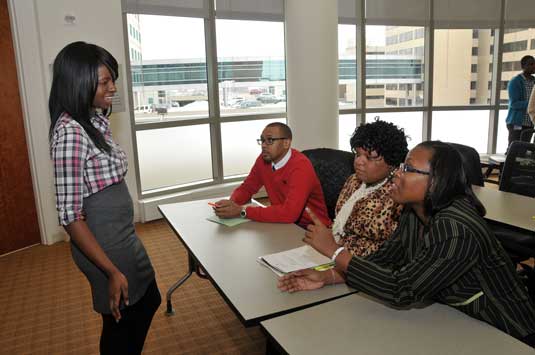Temple University welcomes students from Cheyney, Lincoln to discuss health care opportunities

Temple University’s School of Medicine recently hosted undergradate students from Cheyney and Lincoln universities interested in pursuing a professional degree in the medical field. Temple students, staff and faculty from the schools of medicine, dentistry, pharmacy and podiatry addressed the group to describe what it takes to get into the professional schools.
The visit is one of several Temple programs designed to increase representation of minority students in health and science fields. According to the American Association of Medical Colleges, while about 6 percent of
24-year-old Americans hold an undergraduate degree in science, technology, engineering, or mathematics, the number falls to 2-3 percent for African Americans, Hispanics and Native Americans.
Students from the two Chester County schools who are Pennsylvania residents accepted to Temple and interested in pursuing a degree in medicine, dentistry, public health or law are eligible for the Horace Mann Bond-Leslie Pinckney Hill Scholarship, which is funded by the Commonwealth and covers full tuition, fees and textbooks. The scholarship also applies to two other state-related schools, Pennsylvania State University and the University of Pittsburgh.
Three of Temple’s Bond-Hill Scholars addressed the group, including first-year medical student Hadizat Anaze, a graduate of Lincoln, who told the undergrads, “It’s not about the amount of work there is to do, but the amount of discipline you have to get it done.”
In addition to the Bond-Hill Scholarship, the students who attended the event are also eligible for the medical school’s STEP UP program, which offers a three-month research-based training program for underrepresented students interested in pursuing health care careers.
Now in it's 11th year, the visit was coordinated by the medical school's Recruitment and Retention Program (RAR),
in coordination with the Center for Minority Health and Health Disparities. RAR senior academic counselor Martin Whitaker, Jr. managed the event and facilitated the involvement of the schools of medicine, dentistry, podiatry and pharmacy.
Marla Davis Bellamy, executive director of the
Center for Minority Health and Health Disparities, says that as the graduate of a historically black college, she recognizes the importance of the medical schools’ partnering with HBCUs such as Cheyney and Lincoln.
“Diversity in the health sciences has the potential of improving the health status of people of color in two ways,” she said. “By increasing the educational, employment and socioeconomic prospects of the individuals who become health professionals, and improving the ability of health care providers to address the needs of diverse communities by increasing their internal diversity, cultural competency and understanding of the communities they serve.”